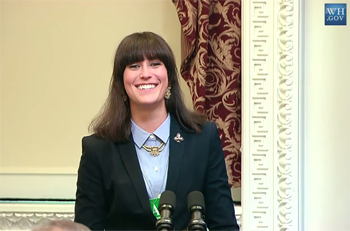The Utah Health Policy Project (UHPP) and Utah Support Advocates for Recovery Awareness (USARA) were awarded a grant from Community Catalyst to highlight how closing the coverage gap would help Utahns in recovery and integrate it into our campaign. Together, UHPP and USARA, have worked on educating Utah’s recovery community on the Affordable Care Act (ACA), Governor Herbert’s Healthy Utah Plan, and how recovery is affected by the Medicaid coverage gap. We have done storybanking of Utahns in recovery, we have created a YouTube channel to share these stories, and we work hard to get Utahns to advocate for their recovery! One of our proudest examples of advocacy through storytelling happened in January, when one of our advocates was invited to speak about her recovery at the White House.

Arielle Spanvill is a Utah woman in long-term recovery from drug and alcohol addiction. She celebrated six years in recovery just five days after she got to share her recovery story at the White House. On January 20, 2015 Arielle boarded a plane headed to Washington D.C. While she waited for her flight, she was scrolling through Instagram and came across a picture the White House posted of President Obama’s inauguration 6 years earlier. On January 20, 2009, Arielle remembers walking out of the Salt Lake County jail after serving a 90 day sentence; flash forward and she was on her way to the White House.
Arielle became overwhelmed with gratitude—which framed the entire trip for her. Filled with anticipation and excitement she landed at Reagan International Airport and the next morning headed to the Substance Abuse and Mental Health Service Administration (SAMHSA) in Maryland before going to the White House with SAMSHA and Center for Mental Health Services staff.
They arrived at the White House and after passing an extensive security check Arielle was in. She walked into the room where the speech was to be delivered, and a rush of anxiety and excitement came over her; she had arrived to give the speech of her life. Arielle took her seat and waited. Finally, it was time for Arielle to take the stage. With no notes, she told her story. Arielle was lost in her words and could hardly remember what she had said when she sat down after she had finished. The people who surrounded her showered her with compliments and told her how fabulous she was. The rest of the meeting was a blur as text messages, Facebook messages, tweets, and emails came pouring in filled with love, admiration and congratulations. The speech was a wild success.
For 10 years, Arielle struggled with an addiction to heroin and ended up in jail. During this time, she was unable to maintain a job or healthy relationships. Today, she feels extremely fortunate to be a graduate from the University of Utah with a Bachelor of Social Work, and she will finish her Master of Social Work in May.
In the last few years, provisions in the ACA made it possible for Arielle to not only receive the physical health care she has needed, but also to manage and maintain her long-term recovery by guaranteeing her treatment is covered at parity with any other health care need. Currently, she receives out-patient therapy to ensure relapse doesn’t happen. She feels her personal growth is crucial to her work as a social worker: if she doesn’t have recovery, she doesn’t have anything.
Arielle has worked as a Recovery Advocate at the Utah State Legislature and has spoken out about issues relating to addiction, parity in health coverage for substance use disorders, health care, and behavioral health for the Utah Association of Counties. She has also done an internship with SAMHSA in Washington, D.C. and worked for the Department of Pharmacological Therapies. For years, she’s worked in substance use treatment programs and recovery residences throughout Utah. She’s been actively involved with local recovery groups, service work, and providing peer support for individuals in recovery, including volunteering for the USARA, Utah’s recovery community organization.
With the help of great advocates like Arielle, UHPP and USARA, work hard to eliminate stigma and affect change where it matters. Arielle does this through sharing her story as often as possible. Arielle believes she can become a part of the solution that involves mobilizing individuals and community resources to promote recovery and spread the message that recovery is possible.
-- RyLee Curtis, UHPP
and Arielle Spanvill
